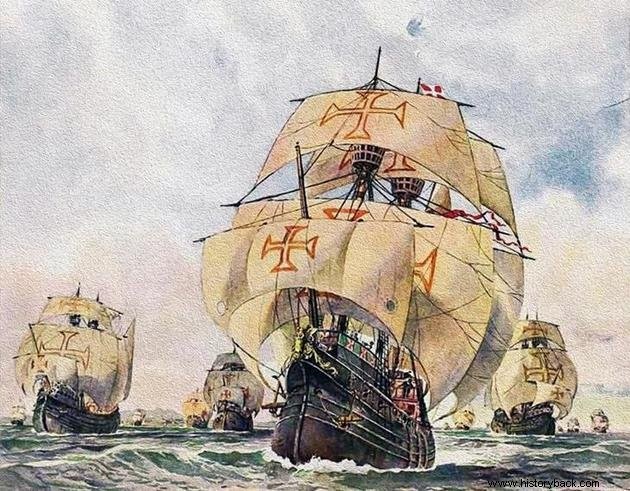The Portuguese navigations began in the 15th century with the conquest of Ceuta and continued throughout the 16th century.
This undertaking was responsible for redrawing the map of the known world so far.
Causes
Several reasons led the Portuguese to embark on this adventure.
- need to open new trade routes;
- expand the Christian faith;
- conquer lands and titles for the nobility.
The fact that they were free from internal warfare and organized as a national state was also an advantage for Portugal to be a pioneer in navigation.
See also:Avis Revolution
The Portuguese country still had a number of economic issues to resolve. The Portuguese crown was short of metals to mint coins, it suffered from insufficient agricultural products, labor and there was a need to expand markets.
Portugal had a geographic advantage that also contributed to its performance at sea due to the easy access to Africa via the Atlantic Ocean.
For this reason, part of the nobility and the bourgeoisie bet on conquering routes by sea to reach these lands and markets.
Expansion
The first great Portuguese conquest was the city of Ceuta, which took place in 1415. Ceuta was a meeting point for several Arab caravans.
The Portuguese navigators went around the coast of Africa by the Atlantic Ocean, in an enterprise organized by, among others, the Infante Dom Henrique, which brings together navigators around the "Escola de Sagres".
This exploration, which became known as the African Periplos, took place between 1415 and 1510. In 1500, the navigator Pedro Álvares Cabral arrived in Brazil.
See below the place and date of arrival of the Portuguese in various parts of the world that are part of Portuguese navigations:
| Location | Date |
|---|---|
| Ceuta | 1415 |
| Madeira Island | 1418 |
| Azores | 1427 |
| Cape Bojador | 1434 |
| Cape Verde | 1444 |
| São Tomé and Príncipe | 1471 |
| Cape Negro | 1484 |
| Cape of Good Hope | 1488 |
| Greenland | 1495-1498 |
| India | 1498 |
| America (Brazil) | 1500 |
| Newfoundland (Canada) | 1500 |
| St. Lawrence Island (Madagascar) | 1500 |
| Ceylon (Sri Lanka) | 1505 |
| Ormuz (Iran) | 1507 |
| Malacca | 1509 |
| Moluccas | 1511 |
| Southeast Asia (China) | 1513 |
| Timor | 1515 |
| Cipango (Japan) | 1542 |
Read more:
- African Periplus
- The First Great Navigations
- European Maritime Expansion
- Discovery of America
